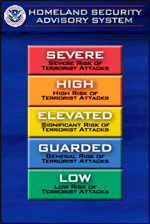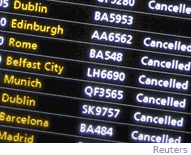A Note to Travelers
 Like the mercury in August, the nation's security threat level is rising again after a long period of stability. This morning's foiled terror plot gave new impetus for Homeland Security Director, Michael Chertoff, to raise the threat level to its highest level (severe) for flights originating in the UK and bound for the U.S. Congruently, all commercial aviation in or destined for the U.S. are on high alert. We should be grateful for the measures our government and the UK's government have taken to maintain our security. They are to be lauded for their accomplishments and our continued safety.
Like the mercury in August, the nation's security threat level is rising again after a long period of stability. This morning's foiled terror plot gave new impetus for Homeland Security Director, Michael Chertoff, to raise the threat level to its highest level (severe) for flights originating in the UK and bound for the U.S. Congruently, all commercial aviation in or destined for the U.S. are on high alert. We should be grateful for the measures our government and the UK's government have taken to maintain our security. They are to be lauded for their accomplishments and our continued safety.So, what does all of this mean for the average American traveler? Beyond today's headaches of cancelled flights, long delays, and lengthy security queues, it has one most noticeable effect--an additional inconvenience at security checkpoints. The prohibition of liquids and gels in all carry-on luggage is bound to be a pain for ignorant or forgetful travelers and a boon for TSA storage bins. Like the ever-expanding world of legislation, the list of prohibited items and practices for air travel is burgeoning without an end in sight. Whenever some terrorist does his best MacGyver impression (think Richard Reid ala December 2001), millions of travelers are forced to perform some concocti
 on of seemingly strange behaviors, like removing their shoes, belts, laptops, etc. Modern advancements like GE's EntryScan systems might enable us to keep our shoes on in the future, but there is no assurance the list of security screening activities won't grow to anything short of a full-body cavity search at some point in time. And similar to legislation, once a procedure is put into practice, it is rarely reviewed for necessity or rescinded in the future. If you don't believe me, take a quick look at U.S. legal code and note the antiquated nature of a myriad of laws still on the books.
on of seemingly strange behaviors, like removing their shoes, belts, laptops, etc. Modern advancements like GE's EntryScan systems might enable us to keep our shoes on in the future, but there is no assurance the list of security screening activities won't grow to anything short of a full-body cavity search at some point in time. And similar to legislation, once a procedure is put into practice, it is rarely reviewed for necessity or rescinded in the future. If you don't believe me, take a quick look at U.S. legal code and note the antiquated nature of a myriad of laws still on the books.Given the nature of the terrorism prevented, the inconvenience is certainly warranted and welcomed. A simple cost/benefit analysis is all one needs to justify jumping through a few simple hoops in order to prevent the loss of lives. However, travelers like myself who are always cutting flight time close, need to be especially diligent the next time we fly. Certainly not a bad idea, but not necessarily an easy one for a procrastinator!


0 Comments:
Post a Comment
<< Home